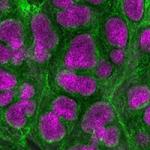
Christopher J. Westlake, Ph.D.
Senior Investigator
Laboratory of Cell and Developmental Signaling
NCI/CCR
Research Topics
My laboratory studies regulation of cellular membrane transport critical in development and normal homeostasis. Our focus has been on understanding the role of membrane trafficking regulators in ciliogenesis and ciliary signaling, including the Hedgehog pathway. Specifically, we are investigating the role of the Rab small GTPase family and associated trafficking regulators in the transport of membranes and signaling cargo at the cilium.
Using cell and zebrafish models along with cellular imaging, biochemistry and proteomics, and genetics systems we have discovered mechanisms for how ciliogenesis is initiated, characterized new regulators of cilium assembly, identified novel ciliary trafficking pathways, and connected these processes to human disorders and cancer. Our findings also provide insight into the basic biological processes of membrane trafficking that are affected in a wide range of human disease states.
For our cellular imaging studies, we utilize cutting-edge approaches including; live-cell and super resolution microscopy (SIM, STED, STORM), transmission electron microscopy, focused ion beam scanning electron microscopy (FIB-SEM), and correlative light and electron microscopy (CLEM).
Postdoctoral Fellowships
The Membrane Trafficking and Signaling Section has an opening for an outstanding postdoctoral fellow and staff scientist to explore membrane trafficking function in organelle biogenesis and signaling using advanced cellular imaging approaches. Please send your C.V. and statement of interest to chris.westlake@nih.gov
Biography
In 2004, Dr. Westlake obtained his Ph.D. in Biochemistry under the supervision of Dr. Roger Deeley at Queen's University in Canada. While there, he investigated the structure/function and trafficking of multidrug resistance proteins (MRP) that are important in resistance to chemotherapeutics. He then joined Dr. Richard Scheller at Genentech as a postdoctoral fellow investigating membrane trafficking regulation by the Rab small GTPase family. In 2011, Dr. Westlake joined the Laboratory of Cell and Developmental Signaling at the Center for Cancer Research where he studies membrane trafficking pathways important in ciliopathy, diseases linked to primary cilia dysfunction, and cancer. He was awarded tenure from NIH in 2020.
Selected Publications
- Zhao H, Sun J, Insinna C, Lu Q, Wang Z, Nagashima K, Stauffer J, Andresson T, Specht S, Perera S, Daar IO, Westlake CJ. Male infertility-associated Ccdc108 regulates multiciliogenesis via the intraflagellar transport machinery. EMBO Rep. 2022;23(4):e52775.
- Insinna C, Lu Q, Teixeira I, Harned A, Semler EM, Stauffer J, Magidson V, Tiwari A, Kenworthy AK, Narayan K, Westlake CJ. Investigation of F-BAR domain PACSIN proteins uncovers membrane tubulation function in cilia assembly and transport. Nat Commun. 2019;10(1):428.
- Walia V, Cuenca A, Vetter M, Insinna C, Perera S, Lu Q, Ritt DA, Semler E, Specht S, Stauffer J, Morrison DK, Lorentzen E, Westlake CJ. Akt Regulates a Rab11-Effector Switch Required for Ciliogenesis. Dev Cell. 2019;50(2):229-246.e7.
- Shimada H, Lu Q, Insinna-Kettenhofen C, Nagashima K, English MA, Semler EM, Mahgerefteh J, Cideciyan AV, Li T, Brooks BP, Gunay-Aygun M, Jacobson SG, Cogliati T, Westlake CJ, Swaroop A. In Vitro Modeling Using Ciliopathy-Patient-Derived Cells Reveals Distinct Cilia Dysfunctions Caused by CEP290 Mutations. Cell Rep. 2017;20(2):384-396.
- Lu Q, Insinna C, Ott C, Stauffer J, Pintado PA, Rahajeng J, Baxa U, Walia V, Cuenca A, Hwang YS, Daar IO, Lopes S, Lippincott-Schwartz J, Jackson PK, Caplan S, Westlake CJ. Early steps in primary cilium assembly require EHD1/EHD3-dependent ciliary vesicle formation. Nat Cell Biol. 2015;17(3):228-240.
Related Scientific Focus Areas

Biomedical Engineering and Biophysics
View additional Principal Investigators in Biomedical Engineering and Biophysics



This page was last updated on Wednesday, December 10, 2025